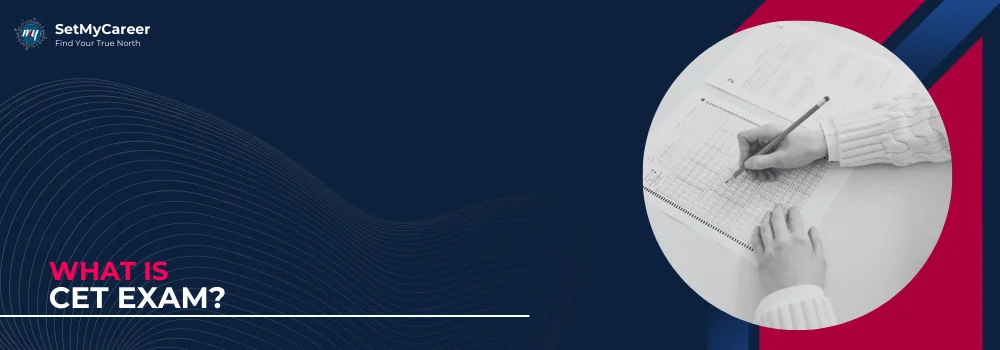Published by Jyothi Patil on 1 April 2025
Content Strategist | Editorial Team Member
Jyothi Patil is a skilled writer with a strong background in English literature, which she applies to crafting engaging content across various platforms. From writing blogs for her website and guest posts to creating pieces on Medium and Substack, Jyothi excels in making complex ideas easy to understand.
A complete guide to understanding the CET exam: purpose, eligibility, and preparation.

Imagine standing at the crossroads of your academic journey, unsure of which path to take. Competitive exams play a crucial role in shaping career opportunities, and the CET Exam is one such important test. But what exactly is CET? How does it work? Who is eligible? If these questions are on your mind, you’re in the right place. In this blog, we’ll explore everything you need to know about the CET Exam, its benefits, and how to crack it successfully.
CET, or Common Entrance Test, is a standardized exam conducted at the state or national level for admission into various undergraduate and postgraduate courses. Different states and universities in India conduct CETs for fields like engineering, medical, law, and management. Some popular CETs include:
Maharashtra CET (MHT CET) – Conducted for admissions into engineering, pharmacy, and agriculture courses in Maharashtra.
Karnataka CET (KCET) – A state-level exam for engineering, medical, and agricultural programs in Karnataka.
Delhi CET – Held for diploma courses in engineering, technology, and management.
CUET (Common University Entrance Test) – A national-level exam for admissions into central universities across India.
TS EAMCET & AP EAMCET – Entrance exams for engineering, agriculture, and medical courses in Telangana and Andhra Pradesh.
WBJEE (West Bengal Joint Entrance Examination) – Used for admission into engineering and technology courses in West Bengal.
These exams ensure a fair and transparent selection process for students aiming for higher education.
Merit-Based Admission – CET scores help universities select students based on merit, reducing bias in admissions.
Cost-Effective – Unlike private college admissions, CET offers an affordable entry route into prestigious institutions.
Multiple Course Options – A single CET score can be used for admission into different programs, providing flexibility.
Government Recognition – Many state-run and central universities rely on CET, making it a widely accepted examination.
Eligibility varies depending on the CET you are applying for, but common criteria include:
| Category | Eligibility Requirements |
|---|---|
| Educational Qualification | Minimum 10+2 (for UG) or Bachelor's degree (for PG) |
| Age Limit | Varies by exam; some require candidates to be at least 17 |
| Nationality | Indian citizens; NRIs may have separate quotas |
| Minimum Marks Required | Usually 50% for general category, 40-45% for reserved categories |
Most CET exams follow a similar structure, which includes:
Subjects Covered: Physics, Chemistry, Mathematics, Biology (for science students), and Logical Reasoning or General Knowledge (for management and law aspirants)
Exam Mode: Online or offline (depending on the CET authority)
Duration: Typically 2 to 3 hours
Marking Scheme: Multiple-choice questions (MCQs), with negative marking in some exams
For example, MHT CET consists of 150 questions covering Physics, Chemistry, and Mathematics, with a total of 200 marks.

Understand the Syllabus – Go through the official syllabus and focus on high-weightage topics.
Create a Study Plan – Allocate daily study hours for different subjects to ensure balanced preparation.
Practice Mock Tests – Attempt past-year papers and sample tests to improve speed and accuracy.
Time Management – Learn shortcut techniques and time-saving strategies to attempt more questions.
Join Coaching or Online Courses – If needed, enroll in a coaching institute or online CET preparation courses.
| Aspect | CET | JEE/NEET |
|---|---|---|
| Scope | State/University Level | National Level |
| Difficulty Level | Moderate | High |
| Courses Covered | Engineering, Medical, Law, Management | Mainly Engineering (JEE) & Medical (NEET) |
| Number of Attempts | Varies | Limited (JEE - 2 per year, NEET - 1 per year) |
CET exams are a great alternative for students who want state-level admissions instead of appearing for national exams like JEE or NEET.
Once the exam results are out, candidates can:
Check their rank and scorecard on the official website.
Participate in counselling sessions to choose colleges based on rank and preference.
Secure admission into government or private institutions.
The CET Exam is an essential gateway for students aspiring to join top universities in India. It offers an affordable and merit-based admission process, making higher education more accessible. If you’re planning to appear for CET, start your preparation today! Need expert guidance? SetMyCareer is here to help you discover your journey to success.
No. 14/595, 1st Floor, Nanjappa Reddy Layout, Koramangala 8th Block, Bangalore 560095